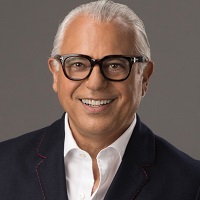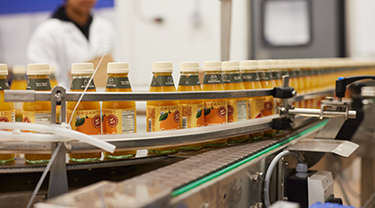
MyEDC gets you the answers you need
Join more than 30,000 Canadians who rely on MyEDC to grow their businesses with confidence.
Sept. 13, 2023

On this week’s episode of the Export Impact Podcast, our host, Joseph Mimran speaks with Ashley Kanary, EDC’s director of global agri-food. Ashley shares how EDC helps guide Canadian companies to identify and embrace international growth opportunities through calculated risks and astute decision-making in the agri-food industry, while sharing tips on the industry’s growth potential.
Where to listen
Follow us on your favourite streaming platforms to never miss an episode of the Export Impact Podcast. Tune in for new episodes every second Wednesday at 6 a.m. EDT.
Joe Mimran: (00:02) Hi, I’m Joe Mimran and welcome back to the Export Impact Podcast. Food is one of the few things that binds all of us together across every region and culture and food also represents a huge opportunity for Canadian businesses to make a positive difference in the world. On this podcast, we’ll be speaking with some of Canada’s most successful exporters of agri-food products, about how they’re reaching new markets and customers all over the world. We’re also going to hear from industry experts who can give us the benefit of their insight and experience.
Today, we have a special guest with us, Ashley Kanary, director of Global Agri-food at EDC. Ashley’s expertise lies in guiding Canadian companies to identify and embrace international growth opportunities through calculated and astute decision-making. Get ready to uncover the secrets behind his remarkable approach. Get ready also to expand your horizons as we embark on a journey to discover the endless possibilities that lie at the intersection of food, business, and global impact.
I'd like to begin today’s episode by acknowledging that we’re recording from my office in Toronto, which is on the traditional unceded territory of many nations, including the Mississaugas of the Credit, the Anishnabeg, the Chippewa, the Haudenosaunee, and the Wendat Peoples, and is now home to many diverse First Nations, Inuit and Metis people. We value taking this moment to deepen the appreciation of our Indigenous communities wherever we are, and to remind ourselves of our shared debt to Canada's First Peoples.
Welcome, Ashley. So glad you could join us on the show today.
Ashley Kanary: (01:52) Thanks, Joe. Happy to be here.
Joe Mimran: (01:54) Just before we get really into it, perhaps you can just give us a little bit of background into how long you’ve been involved in the agri-food sector and perhaps provide some details about your experience and roles within the industry.
Ashley Kanary: (02:08) Sure. I’ve been in the food business for more than 40 years. I climbed the ladder and worked my way up from the bottom and I started off working in grocery stores and then I branched into sales and then from there, sales management. Then I went into executive roles in running food companies in Canada and now I’m here at EDC. It’s really been an amazing journey so far, to be honest. I’ve seen and learned so much over the years and now, I’m in a position where I can share the knowledge with other people.
Joe Mimran: (02:35) Wonderful. And agri-food is such a vast and diverse field. What specifically drives your passion for this industry and are there any personal experiences or values that have shaped your dedication to agri-food?
Ashley Kanary: (02:50) To me, food has always been something that unites us all. We all need to eat, but for me, it's much more than that. For me, food is the glue that binds everything from relationships and unites families together and makes peace, satisfies our curiosity for great cuisine. It’s the source of great entertainment and it’s the foundation of our culture overall.
Joe Mimran: (03:11) That’s pretty all-encompassing. I think when you say makes peace as well, that’s something the world could use a little of these days. The agri-food sector is known for its continuous evolution. Can you give us a preview of some of the emerging trends and innovations that you believe are shaping the future of the sector?
Ashley Kanary: (03:30) There are a few trends that are dominating agri-food these days. Our team set our core pillars on three main areas.
Joe Mimran: (04:34) That’s quite a few areas. It’s interesting you started with plant-based protein and the knock-on effect of plant-based protein in that it’s animal welfare; it’s a healthier lifestyle. What would make Canada a leader in that regard?
Ashley Kanary: (04:52) It’s the plant-based pea protein that we grow today in Western Canada. Canada has vast resources and natural abilities to grow plant-based products. We have huge crops, great pulses, great greens, and great tech and innovation driving plant-based protein innovation globally. Plus, Canada’s a great reputation, as well in that category. Both those things alone make us leaders.
Joe Mimran: (05:14) In today’s landscape, there are so many challenges that we’re all grappling with. What are some of the significant obstacles that some of these companies currently face and how do these challenges affect competitiveness, growth, and sustainability?
Ashley Kanary: (05:30) There’s definitely a few challenges that people have these days in Canada.
Joe Mimran: (07:24) On that, it’s an interesting point. I mean we went through this obviously with supply chain and the cost of containers, like quadrupling, if not more during COVID. But there were a lot of containers that were going back to Asia empty. Did our exporters take advantage of that opportunity?
Ashley Kanary: (07:42) They didn’t because... in a lot of instances, the price that they were charging, even though they were sending them back empty, if they wanted to send them full during COVID, the prices of those were excessive, as well. It even scared people away at the time. A lot of times, during COVID, people used their capacity to go more towards exporting to the United States.
Joe Mimran: (08:01) You mentioned access to working capital. Obviously, as these companies grow, that’s such a huge issue is working capital. I was wondering whether in the landscape of Canadian exporters over a myriad of different industries, does agri-food have an advantage in that we have such an abundance of resources here in Canada that they’re in the best position to be exporters?
Ashley Kanary: (08:27) In Canada, I think we do have a unique position, but we don’t grow more than we have. It all depends on Mother Nature. The crops were impacted last year. We had lower yields than expected. But there are circumstances around the world that do drive consumption. Like the war in the Ukraine, it put an immense pressure on Canada’s food supply chain. So, there’s always going to be something happening, another natural disaster or another insurgence somewhere, where it does put pressure on Canada’s supply chain. I think the quality of the product in which we produce and the uniqueness of some of the items that we have to export is what sets us apart. Plus, Canada has an amazing reputation for quality in the market and that’s something that we shouldn’t take for granted. We should focus on making our reputation stronger.
When products come from Canada, they stand out on the shelf. Consumers are willing to pay a premium most of the time. And I think the No. 1 thing for Canadian exporters to do is know the market and know what they’re looking for and then present it. We think, in order to be wanted, you first need to have something that the companies abroad want and that’s where we come in. We’ll help companies understand the markets that they’re entering into, just through availability of sale and marketing intelligence and to understand the sector through things, like connections and then ultimately, introductions, in many cases. We feel like a warm intro goes a long way.
Joe Mimran: (09:40) And you mentioned quality and reputation for Canadian products, which I’ve heard over and over again that for example, in a country, like China, they trust our food and food ingredients almost over their own production in that country and that’s why certain things, like baby food and things of that nature, do so well in that country.
Ashley Kanary: (10:01) That’s true. Canada has an amazing reputation for great quality and quality manufacturing, quality ingredients, and great products. It’s a halo that Canada wears proudly and it’s something that I believe we need to boast a lot more about.
Joe Mimran: (10:15) On that note, what can Canadian businesses do to set themselves apart even more so?
Ashley Kanary: (10:21) I actually believe that it’s about great packaging. It’s identifying the fact that you’re made in Canada on your packaging. I think boasting that it’s engaging with companies, like ours at EDC, and it’s understanding the market that you go into. I think that’s very important. It’s understanding the pitfalls. It can be a financial nightmare for companies to go abroad and not understand the market that they’re entering. It can be very expensive, but there are resources out there. We’d like Canadian companies to take advantage of them.
Joe Mimran: (10:48) And how can Canadian companies use advances in automation innovation to their advantage?
Ashley Kanary: (10:54) Oh, thank God, you asked that question because it’s actually one of the most important ones you’ve asked. I think automation's really important and we need to do far more with what we have and that comes through automation. Canada’s had a labour shortage for years and automation helps mitigate the lack of labour. We can materialize a million acres more to grow crops on, meaning we have to do a lot more with the land that we have. And the same goes for processing plants. In order to compete on a global scale, we need to automate. There are a lot of countries globally that are amazing at processing food. So, automation allows us to produce better and faster versus our competition. Competition has grown significantly over the last few years and processing and manufacturing capabilities have also grown significantly, too. It’s critical for getting the companies to invest in that automation and get state-of-the-art equipment. We have to increase our output and capture the lost opportunities. If we dramatically increase the products in which these products are produced, it’ll bring down the cost of production and that’s what makes us competitive.
Joe Mimran: (11:49) Many Canadian businesses start by exporting into the U.S., but then many of them don’t grow beyond the U.S. What are your thoughts on that?
Ashley Kanary: (12:00) It’s about available capacity and comfort and the United States is very familiar; it's geographically appealing. They have a similar culture and there’s a lot of business there. So, most companies use up the majority of their capacity on the U.S. We’re looking to work with Canadian companies to expand their capacity and allow for expansion to new areas, like the Indo-Pacific region that I was mentioning earlier. We’ll leave a lot of opportunities on the table with some of the free trade agreements that we’ve signed. The biggest ones for Canada, we have that Canada-U.S.-Mexico Agreement—CUSMA. We have CETA (Comprehensive Economic Trade Agreement) in Canada and Europe, the CPTPP. Canadian companies should look beyond the U.S. border and explore new markets. Businesses always believe that there’s a risk in doing business in those regions due to limited knowledge or maybe company contacts, but we could play a significant role in helping minimize those risks.
Joe Mimran: (12:44) EDC is the master chef behind the push of Canadian agri-food exporters. I really think that EDC provides an amazing service that I wish I had taken advantage of early in my career when I was off to China and off to Japan and Korea because you do so much on so many levels—from the contacts to the financing to the in-market intelligence and all the things that you’ve referred to. When we offer specific examples of Canadian businesses performing, we can always learn from those and we’re always hungry to hear about Canadian success stories. So, perhaps you can wet our appetite by sharing some captivating tales of Canadian agri-food companies that have conquered foreign markets with their delectable offerings.
Ashley Kanary: (13:36) That’s really good. I’m glad you asked that. I have a great example actually. EDC works heavily in the seafood industry and one of Canada’s largest seafood tech exporters was working on an acquisition for expansion into Australia. We leaned in and worked very closely with that company on their first investment into Australia, and it was the largest ever for a family-owned seafood company since its inception. They acquired Australia’s largest vertically integrated salmon producer that annually harvests more than 40,000 metric tonnes of Atlantic salmon and they raise black tiger shrimp. It was a billion-dollar transaction and EDC was really proud to be the lead loaner. We brought in two other banking partners to make that deal a reality. It was us helping facilitate a major Canadian seafood organization explore expanding into Australia, and they do that through acquisition and we help with that.
Joe Mimran: (14:25) That should be a lesson to all agri-food players out there to really jump on the opportunity. If I was in that industry, I would be calling you guys up and immediately.
Ashley Kanary: (14:37) That’s true.
Joe Mimran: (14:38) Any Canadian companies that have spiced things up with cutting-edge technology or culinary advancements?
Ashley Kanary: (14:45) We actually have so much. Canada leads in the plant-based meat category. So, plant-based burgers out of Montreal, we've seen companies that do plant-based chocolate. A few weeks ago, I saw a company that makes 3D-printed meat and I couldn't believe it. I ate a 3D-printed steak and it tastes exactly like filet mignon.
Joe Mimran: (15:04) Wow.
Ashley Kanary: (15:05) Those are the advances that are happening and it’s far beyond. There’s a lot of work. And then behind the scenes on cellular meat and it’s all again about animal welfare. They can take DNA from a live cow and culture that and produce meat, steaks, chicken without harming the animal. And I think advancements like that are going to go a long way.
Joe Mimran: (15:24) How long do you think it will take before that becomes common practice or common, I would say, product on our food shelves?
Ashley Kanary: (15:35) It’s a shorter runway than you think. I would say in the next three to five years, it will become an everyday occurrence to see cellular meat in stores.
Joe Mimran: (15:42) Is the cost similar?
Ashley Kanary: (15:44) Today, it isn’t. It’s roughly two to three times the price. So, you’d have to buy it under ethical reasons, but that’s what’s coming down. And there are companies in the U.S. that are achieving that and achieving price parity and Canada’s falling very closely behind. That’s why I say between three to five years, you’ll see price parity and you’ll see it become mainstream. I think the true market of success is if you can find something that’s the same price as what it’s replacing.
Joe Mimran: (16:10) Does the pet food category fall into agri-food and do you have any examples? I mean, I know of one company out west, I think it’s Champion Foods, that have grown to 80, 90 different countries and grew from a very small business into a very large business because there’s so much interest in that pet category, as well.
Ashley Kanary: (16:30) The main regions of the world where pet food is exported heavily is China and Canada...out of the Top 10 companies in China, Canada probably has five or six. We’re significant players in that market. What’s growing out there is premium pet food, actually. So, you get a rising middle class and they’re spending more on their animals. They’re buying premium pet treats and that’s what we see growing. The standard pet food has always been there. The traditional kibble does a pretty good job, but where we’re seeing explosive growth as in premium foods. Canada does a really good job and there are a dozen companies within Canada doing excellent work in that field under the premium space.
Joe Mimran: (17:10) How much of it is marketing versus say, technology, or some of the other aspects of business do you think?
Ashley Kanary: (17:22) I would say that it’s less and less about marketing. It’s a lot more about technology and quality. Once you get automation combined with amazing quality, if you look at the pet food industry, it’s a lot of people putting out human-grade pet food. And that’s the type of quality that you’re seeing these days and people will pay a difference for that.
Joe Mimran: (17:39) If you’re not from the industry and you wanted to get a piece of the action, what’s the first thing somebody should think about doing or starting? How would you go about it, if you’re a complete neophyte?
Ashley Kanary: (17:50) Call EDC. We’ll help you. We have a lot of resources for companies that are starting up. We even work with companies that are very small, women-owned, Indigenous businesses, and Black-owned. There’s significant resources within the Canadian government overall. We have a network of partners, Canada’s Trade Commissioner Service (TCS), which helps you, as well. There’s a lot of resources. I’d say anybody who wants to get into this industry, the first thing you need to do is know more about it, know what you’re getting into, and then do your research. Once you’ve done the research and you choose where you’d like to go, then find the right partners.
Joe Mimran: (18:23) What’s your vision for the future of Canadian agri-food? How do you see agri-food within Canada exporting around the world?
Ashley Kanary: (18:32) For me, the vision for Canadian companies to get access to a world of opportunity beyond North America and to have a clear path to achieve the goal. The global population is expected to hit 10 billion by 2050, and we need to be ready to supply great Canadian products when it happens. I think that if people are moving to the U.S. and not moving out every three to five years, we’d like to shorten that runway to one to three years and have them leave the U.S. in one to three years and go global and look at other areas, like the Indo-Pacific region and get access to those four billion people versus the 300 million in the United States. I think that’s a world of opportunity that’s there. When we see a vision, it’s growing Canada’s exports by seeing expansion beyond North America.
Joe Mimran: (19:14) So fascinating. You have so many insights into the industry and it’s so far-reaching and I think so interesting. It’s got so many elements to it and it’s such a big business, big industry. I always ask this question at the end of every single show. I look for advice that you can give as a connoisseur of international growth, perhaps you can provide us with your secret ingredients that you can share with our audience.
Ashley Kanary: (19:43) You know what the main words are: You’re not alone. There’s a huge network out there—inside Canada and abroad—to help you grow. We’re here for you. Just give us a call and we can help. I think that’s one of the most misunderstood things about Canada is the fact that there are a lot of resources at your fingertips. You just need to reach out and call and they’ll be there for you and most of that help is free.
Joe Mimran: (20:03) Totally fascinating. Ashley, thank you so much for joining us today and for your invaluable advice and insight. I’m sure it’s much appreciated by all of our listeners. Thanks for joining us today on the Export Impact Podcast. If you enjoyed today’s episode, we’d love for you to subscribe, rate, and leave us a review on your favourite streaming platform. See you back here in two weeks

Guest
Director, global agri-food | Export Development Canada

Host
CEO of Joseph Mimran & Associates Inc, founder of Club Monaco & Joe Fresh and former Dragon on CBC Dragons’ Den

Join more than 30,000 Canadians who rely on MyEDC to grow their businesses with confidence.

Explore the latest trends and highlight the top opportunities for Canadian agri-food businesses.

Maximize the working capital you can access from your financial institution by leveraging an EDC guarantee.